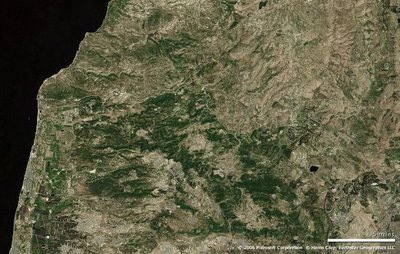
The "conflict" isn't a new one. I tend to think of it as a war unlike any other, raging since before anyone can remember, built upon shifting and sometimes far-flung geography. It is stoked by the opinions, allegiances, and actions of persons outside of the theater-proper, many of whom have no legitimate reason to take sides.
In talking recently about this flame that has fanned itself once more from so many smoldering embers, I heard it again. Someone shrugged and said, "It's such an old conflict. And neither side is blameless. What do you expect?" With that, the speaker absolved a thousand moral failings and excused new excesses, based upon the crimes of the enemies' fathers.
How many have to die before one score equals another? Is there a plan to end the war that doesn't involve something like genocide?
The elephant in the room is the fact that every event in this conflict is the result of a choice- a choice to kidnap or capture soldiers, a choice to respond with force that has ended the lives of more children than men bearing arms, and the spectrum of choices of those outside of the conflict on how to respond. Every time the war is reignited, escalated, or encouraged from afar, someone bears the onus of having chosen war over peace.
No one can decide the outcome of last year's battle or punish someone who died half a century ago. We do, however, have the power to decide if children die tomorrow.
Tuesday, August 01, 2006
Pyre
I spent a little time yesterday evening with a couple of Goode's World Atlases. One is from the 1940's, the other a more recent mint. The old one shows a state called Palestine, that looks like the uninterrupted sum of what the new one calls Israel, the Gaza Strip, and the West Bank, with so many asterisks. The truth of the places and the people living there is so much more complicated than either map can express.
Subscribe to:
Post Comments (Atom)

2 comments:
well put. i'm going to assume this is about the situation in the middle east?
anyway, thanks for the recommendation, i've been dying for a good read. it seems my life is too occupied with the internet; the net died recently, then the computer dies from a power outage. all this heat is getting to everyone. no comp, no net, just a lot of commercials on tv is roadkill for the brain. anyway, just thanks. and hey, it sounds like you know keith donohue personally? that sounds soo neat =)
i'll catch you later when i have a stable connection again. if my interpretation happens to be wrong, i hope it doesn't offend. till then!
Kit,
To give this post a little more context, the satellite image shows the Israeli-Lebanese border and the Golan Heights area, though it doesn’t go quite as far south as the West Bank. I thought the idea of this map without boundaries was symbolic of a multi-front war and such ideological strife among neighbors.
As for the question about Keith, I should say that I know him professionally. He and I (and three other) share a suite of offices. As you might imagine, there are several fans of The Stolen Child here.
I hope your power and your computer start behaving themselves a little better. In the mean time, I can now personally recommend The Limits of Enchantment, having gotten about halfway into it. It has a very familiar style that reminds me of Donohue, and deals with some likeminded themes- the natural v. the supernatural, the relationships of parents with children. A good read.
Post a Comment